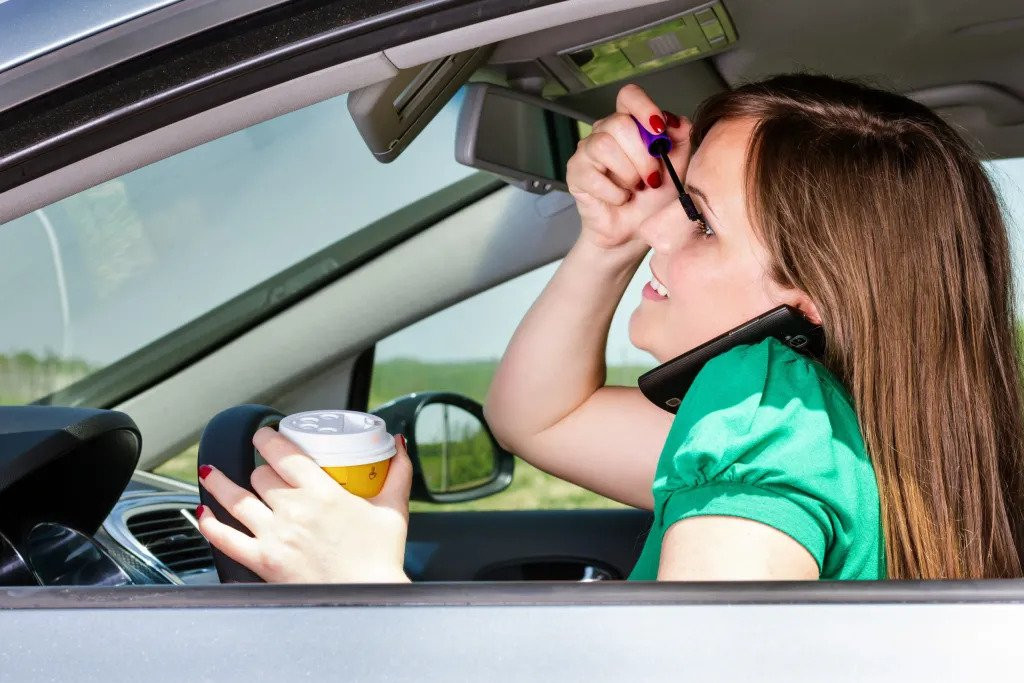Distracted driving has been recognized as a serious problem by lawmakers, resulting in many states banning cellphone use while driving, adopting hands-free only rules or taking other action to curb the use of cell phones while driving. Individuals who are found to be engaging in distracted driving can face a variety of serious consequences.
Distracted Driving Components
Distracted driving consists of driving while distracted in any manner. While cell phone use is often a part of it, distracted driving also encompasses many other activities, including eating, reading, drinking, talking to other passengers, looking around, adjusting location devices, adjusting the radio or any other activity that takes the driver’s attention away from the task of driving. While any of these activities may be involved, texting while driving is usually considered the most serious type of distracted driving because it causes the most types of distraction.
Some types of distracted driving are visual in nature. These activities take the driver’s eyes off of the roadway. Others are manual in nature, meaning that they take the driver’s hands off of the wheel. Other activities are cognitive. This means that they take the driver’s mind off of driving.
Distracted Driving Statistics
According to the National Highway Traffic Safety Administration, ten percent of fatal crashes in 2013 were reported as being affected by distracted driving. In the same year, 18 percent of crashes involving injuries were reported as such. A total of 16 percent of all motor vehicle crashes that were reported to police were considered distracted-affected.
The Centers for Disease Control and Prevention reported that in 2013, 3,154 people were killed. Additionally, 424,000 people were injured in crashes involving distracted drivers. This resulted in 8 people dying every day in the United States because of distracted driving and 1,161 people being injured in reported crashes each day.
Seriousness of Distracted Driving
Many lawmakers recognize the seriousness of distracted driving. When a driver is not looking while driving, has his or her hands off the wheel or is mentally focused on something other than driving, the likelihood of being involved in a crash increases dramatically. Some studies have shown that people who text or talk on a cell phone while driving are just as impaired as drunk drivers. Studies have also shown that hands-free and hand-held cell phone use results in approximately the same level of impairment. Distracted drivers often lose seconds of response time that they would have had if they were not distracted, potentially causing them to crash when they could have avoided it or crash at higher speeds than they would have if they were not distracted.
Potential Consequences
Being distracted while driving can result in a number of serious and life-altering consequences. Some of these potential consequences include:
Being Involved in an Accident
A distracted driver is much more likely to be involved in an accident than one who is not. Additionally, distracted drivers are more likely to be involved in serious accidents. This means that they may be injured or even killed. They may also cause other motorists and passengers to be injured or killed.
Criminal Penalties
Distracted driving is specifically outlawed in a number of states. Some states specify prohibitions on using a cell phone while driving or may permit using a hands-free phone. Many states outlaw texting while driving. If a person is caught using a cell phone while driving or engaging in other forms of distracted driving that are prohibited by law, they may face serious fines. Even if they live in a state that does not specifically outlaw the conduct that caused the distraction, they may still be ticketed because of other infractions caused by their distracted driving, such as crossing the centerline, driving at erratic speeds or similar conduct.
If they are involved in an accident, they may face more serious criminal consequences, especially if someone was seriously injured or killed.
Higher Insurance Premiums
Insurance rates are tied to a driver’s driving history. If he or she receives multiple traffic citations or accumulates too many points on his or her driving record, insurance premiums may spike.
Lost Driving Privileges
If a person accumulates too many points on his or her driving record, he or she may lose driving privileges through a suspended or revoked license.


